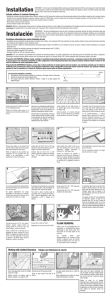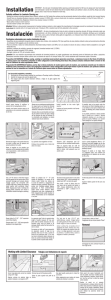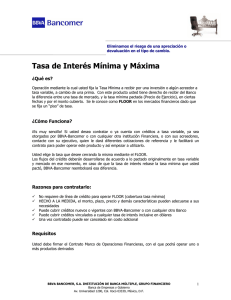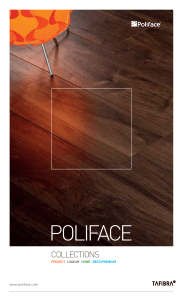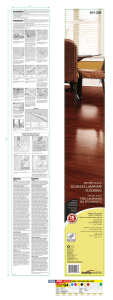5G Installation Instructions
Anuncio
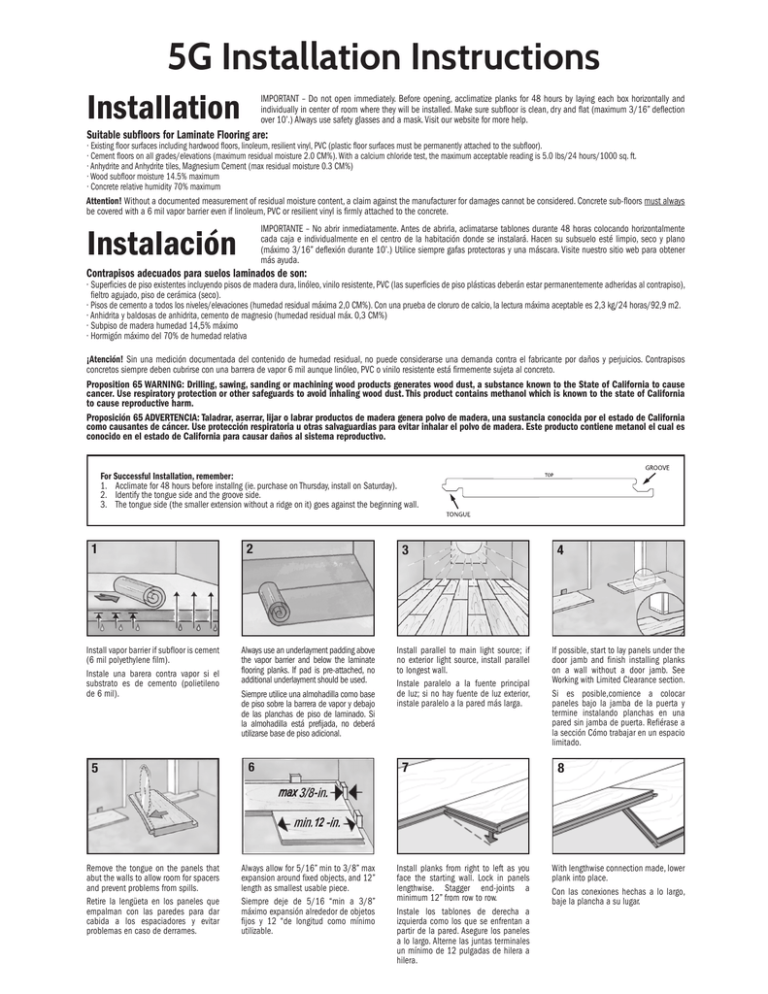
DAMAGES. (SOME STATES DO NOT ALLOW FOR THE EXCLUSION OF CONSEQUENTIAL DAMAGES, SO THIS EXCLUSION OF CONSEQUENTIAL DAMAGES MAY NOT APPLY TO YOU.) THIS WARRANTY GIVES YOU SPECIFIC LEGAL RIGHTS AND YOU MAY HAVE OTHER RIGHTS THAT MAY VARY FROM STATE TO STATE. THE FOREGOING WARRANTY CONSTITUTES THE ENTIRE AGREEMENT OF THE PARTIES, AND NO WAIVER OR AMENDMENT SHALL BE VALID UNLESS IN WRITING AND SIGNED BY AUTHORIZED REPRESENTATIVES OF MANUFACTURER. Effective date July 2015. DAÑOS CONSECUENCIALES, DE MODO QUE ESTA EXCLUSIÓN DE DAÑOS CONSECUENCIALES PUEDE QUE NO APLIQUE EN SU CASO). ESTA GARANTÍA LE OTORGA DERECHOS LEGALES ESPECÍFICOS PERO USTED PODRÁ TENER OTROS DERECHOS QUE PODRÍAN VARIAR DE ESTADO A ESTADO. LA GARANTÍA ANTERIOR CONSTITUYE EL ACUERDO TOTAL DE LAS PARTES Y NINGUNA EXENCIÓN O MODIFICACIÓN TENDRÁ VALIDEZ A MENOS QUE SE EFECTÚE POR ESCRITO Y ESTÉ FIRMADA POR REPRESENTANTES AUTORIZADOS DE MANUFACTURER. 5G Installation Instructions Fecha efectiva: julio de 2015. Installation IMPORTANT – Do not open immediately. Before opening, acclimatize planks for 48 hours by laying each box horizontally and individually in center of room where they will be installed. Make sure subfloor is clean, dry and flat (maximum 3/16” deflection over 10’.) Always use safety glasses and a mask. Visit our website for more help. Suitable subfloors for Laminate Flooring are: · Existing floor surfaces including hardwood floors, linoleum, resilient vinyl, PVC (plastic floor surfaces must be permanently attached to the subfloor). · Cement floors on all grades/elevations (maximum residual moisture 2.0 CM%). With a calcium chloride test, the maximum acceptable reading is 5.0 lbs/24 hours/1000 sq. ft. · Anhydrite and Anhydrite tiles, Magnesium Cement (max residual moisture 0.3 CM%) · Wood subfloor moisture 14.5% maximum · Concrete relative humidity 70% maximum Attention! Without a documented measurement of residual moisture content, a claim against the manufacturer for damages cannot be considered. Concrete sub-floors must always be covered with a 6 mil vapor barrier even if linoleum, PVC or resilient vinyl is firmly attached to the concrete. Instalación IMPORTANTE – No abrir inmediatamente. Antes de abrirla, aclimatarse tablones durante 48 horas colocando horizontalmente cada caja e individualmente en el centro de la habitación donde se instalará. Hacen su subsuelo esté limpio, seco y plano (máximo 3/16” deflexión durante 10’.) Utilice siempre gafas protectoras y una máscara. Visite nuestro sitio web para obtener más ayuda. Contrapisos adecuados para suelos laminados de son: · Superficies de piso existentes incluyendo pisos de madera dura, linóleo, vinilo resistente, PVC (las superficies de piso plásticas deberán estar permanentemente adheridas al contrapiso), fieltro agujado, piso de cerámica (seco). · Pisos de cemento a todos los niveles/elevaciones (humedad residual máxima 2,0 CM%). Con una prueba de cloruro de calcio, la lectura máxima aceptable es 2,3 kg/24 horas/92,9 m2. · Anhidrita y baldosas de anhidrita, cemento de magnesio (humedad residual máx. 0,3 CM%) · Subpiso de madera humedad 14,5% máximo · Hormigón máximo del 70% de humedad relativa ¡Atención! Sin una medición documentada del contenido de humedad residual, no puede considerarse una demanda contra el fabricante por daños y perjuicios. Contrapisos concretos siempre deben cubrirse con una barrera de vapor 6 mil aunque linóleo, PVC o vinilo resistente está firmemente sujeta al concreto. Proposition 65 WARNING: Drilling, sawing, sanding or machining wood products generates wood dust, a substance known to the State of California to cause cancer. Use respiratory protection or other safeguards to avoid inhaling wood dust. This product contains methanol which is known to the state of California to cause reproductive harm. Proposición 65 ADVERTENCIA: Taladrar, aserrar, lijar o labrar productos de madera genera polvo de madera, una sustancia conocida por el estado de California como causantes de cáncer. Use protección respiratoria u otras salvaguardias para evitar inhalar el polvo de madera. Este producto contiene metanol el cual es conocido en el estado de California para causar daños al sistema reproductivo. For Successful Installation, remember: 1. Acclimate for 48 hours before installng (ie. purchase on Thursday, install on Saturday). 2. Identify the tongue side and the groove side. 3. The tongue side (the smaller extension without a ridge on it) goes against the beginning wall. 1 Install vapor barrier if subfloor is cement (6 mil polyethylene film). Instale una barera contra vapor si el substrato es de cemento (polietileno de 6 mil). 5 2 3 Always use an underlayment padding above the vapor barrier and below the laminate flooring planks. If pad is pre-attached, no additional underlayment should be used. Siempre utilice una almohadilla como base de piso sobre la barrera de vapor y debajo de las planchas de piso de laminado. Si la almohadilla está prefijada, no deberá utilizarse base de piso adicional. Install parallel to main light source; if no exterior light source, install parallel to longest wall. Instale paralelo a la fuente principal de luz; si no hay fuente de luz exterior, instale paralelo a la pared más larga. 7 6 4 If possible, start to lay panels under the door jamb and finish installing planks on a wall without a door jamb. See Working with Limited Clearance section. Si es posible,comience a colocar paneles bajo la jamba de la puerta y termine instalando planchas en una pared sin jamba de puerta. Refiérase a la sección Cómo trabajar en un espacio limitado. 8 max 12 Remove the tongue on the panels that abut the walls to allow room for spacers and prevent problems from spills. Retire la lengüeta en los paneles que empalman con las paredes para dar cabida a los espaciadores y evitar problemas en caso de derrames. 9 Always allow for 5/16” min to 3/8” max expansion around fixed objects, and 12” length as smallest usable piece. Siempre deje de 5/16 “min a 3/8” máximo expansión alrededor de objetos fijos y 12 “de longitud como mínimo utilizable. 10 Install planks from right to left as you face the starting wall. Lock in panels lengthwise. Stagger end-joints a minimum 12” from row to row. Instale los tablones de derecha a izquierda como los que se enfrentan a partir de la pared. Asegure los paneles a lo largo. Alterne las juntas terminales un mínimo de 12 pulgadas de hilera a hilera. 11 With lengthwise connection made, lower plank into place. Con las conexiones hechas a lo largo, baje la plancha a su lugar. 12 empalman con las paredes para dar cabida a los espaciadores y evitar problemas en caso de derrames. 9 máximo expansión alrededor de objetos fijos y 12 “de longitud como mínimo utilizable. 10 Do not tap end joints with tapping block and hammer. Merely press the end down to lock into place. No golpee ligeramente las juntas terminales con el bloque o el martillo. Simplemente presione el extremo hacia abajo para que calce en su lugar. 13 Cut last row to size. (2-1/2” min. width). Remove plastic tongue before rip cutting planks for first and last row, break tongue to size and reinsert. Corte la última fila al tamaño (2-1/2 pulgadas de ancho, mínimo (6,3 cm)). Retirar la lengüeta de plástico antes de cortar a lo largo siguiendo la veta para la primera y la última hilera, cortar la lengüeta a medida y reinsertar. To measure and cut last piece in a row, rotate offcut section 180º, mark accordingly, cut, rotate back 180º and slot into space. Para medir y cortar la última pieza de una hilera, rote la sección del recorte a 180º, marque debidamente, corte, rote nuevamente a 180º y coloque en el espacio. Instale los tablones de derecha a izquierda como los que se enfrentan a partir de la pared. Asegure los paneles a lo largo. Alterne las juntas terminales un mínimo de 12 pulgadas de hilera a hilera. An expansion gap T-strip is required when length of planks measure 40’ max and when width of planks measures 25’ max. Transition strips must be placed in all doorways directly under the door when the door is closed. Se requiere un listón en T para separación de expansión cuando el largo de las planchas mida 12,2 m máx. y cuando el ancho de las planchas mida 7,6 m máx. Las tiras de transición deben colocarse en todas las puertas directamente debajo de la puerta cuando la puerta está cerrada. Always allow for 5/16”- 3/8” expansion around fixed objects. Siempre deje de 5/16 “-3/8” expansión alrededor de objetos fijos. 14 Ensure floor is able to “float”. Asegúrese de que el piso puede “flotar”. 12 11 15 PLANK REMOVAL Planks must be disengaged from any proceeding or subsequent rows before attempting to slide planks away from each other on the same plane as the sub floor. Los tablones deben estar desenganchados de cualquier hilera anterior o siguiente antes de intentar separar los tablones unos de otros en el mismo plano que el contrapiso. Working with Limited Clearance Trabajos con limitaciones de espacio 1 2 3 Some long edge joints cannot be installed Remove top part of the groove profile. Use good quality wood glue to make the using a 20° angle. Quitar la parte superior del perfil de la connection. Algunas uniones de extremo largo no ranura. Utilice pegamento para madera de buena pueden instalarse a un ángulo de 20º. calidad para efectuar la conexión. CLEANING & CARE Congratulations on choosing your new laminate floor. Laminate flooring is virtually maintenance free. Normal vacuuming (use hard floor setting) and sweeping will usually keep your floor clean. If stubborn spots still remain, 4 Slide panel into space horizontally and slot into profile. Use these modified planks under doorframes, radiators, cabinet fronts, etc. Use the pull bar to slide the planks where needed. Deslice el panel en el espacio horizontalmente y coloque dentro del perfil. Utilice estas planchas modificadas bajo los marcos de las puertas, radiadores, frentes de gabinetes, etc. Utilice la barra de tracción para deslizar las planchas donde sea necesario. de gabinetes, etc. Utilice la barra de tracción para deslizar las planchas donde sea necesario. CLEANING & CARE Congratulations on choosing your new laminate floor. Laminate flooring is virtually maintenance free. Normal vacuuming (use hard floor setting) and sweeping will usually keep your floor clean. If stubborn spots still remain, use a laminate floor cleaner. Recommended Tips • Never leave any amounts of liquids (water, juices, soft drinks, alcohol, etc.) on the floor for more than the time necessary to clean the spill. Immediately wipe up wet areas from spills, foreign substances or wet shoes. • Do not use any cleaning agents containing wax, oil or polish. Left over residue from these agents can leave a dull film on the floor. • Do not use steel wool or scouring powder, as this could scratch the floor. • Use either a natural or color-fast doormat outside and inside each entrance to your home to prevent dirt, sand, grit and other substances from being tracked onto the floor. • Use wide-bearing, non-staining floor protectors, such as felt protectors for chair legs and table legs. Cleaning Stains and Other Problems Juice, Wine, Grease, Chocolate Dampen a rag with water and a laminate floor cleaner and spot clean. Cigarette Burns, Asphalt, Shoe Polish, Paint, Ink, Crayon, Dried Foods, Nail Polish Dampen a rag with rubbing alcohol or nail polish remover and spot clean. Candle Wax, Chewing Gum Allow to harden and gently scrape with a plastic scraper. CAUTION - Using too much water or any other cleaning solution could result in the planks swelling, creating permanent damage to your floor. This damage would NOT be covered by Manufacturer’s Limited Warranty. Kronotex USA, LLC October 2015
